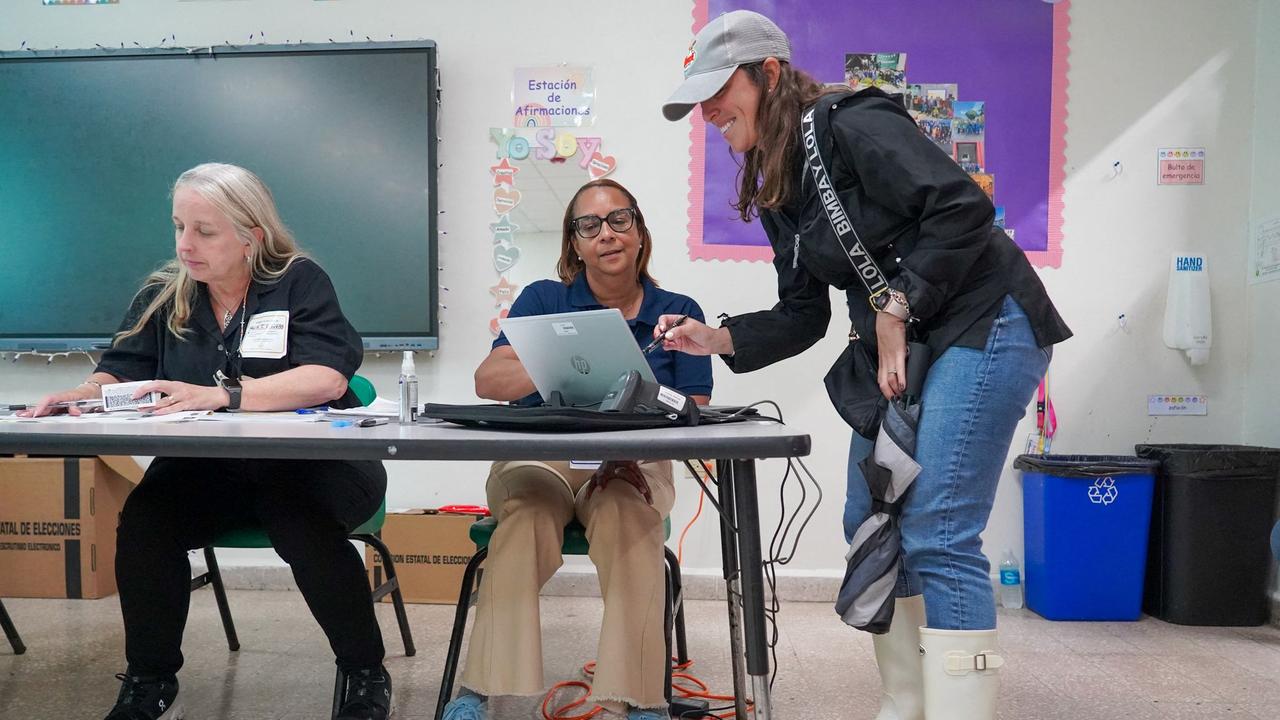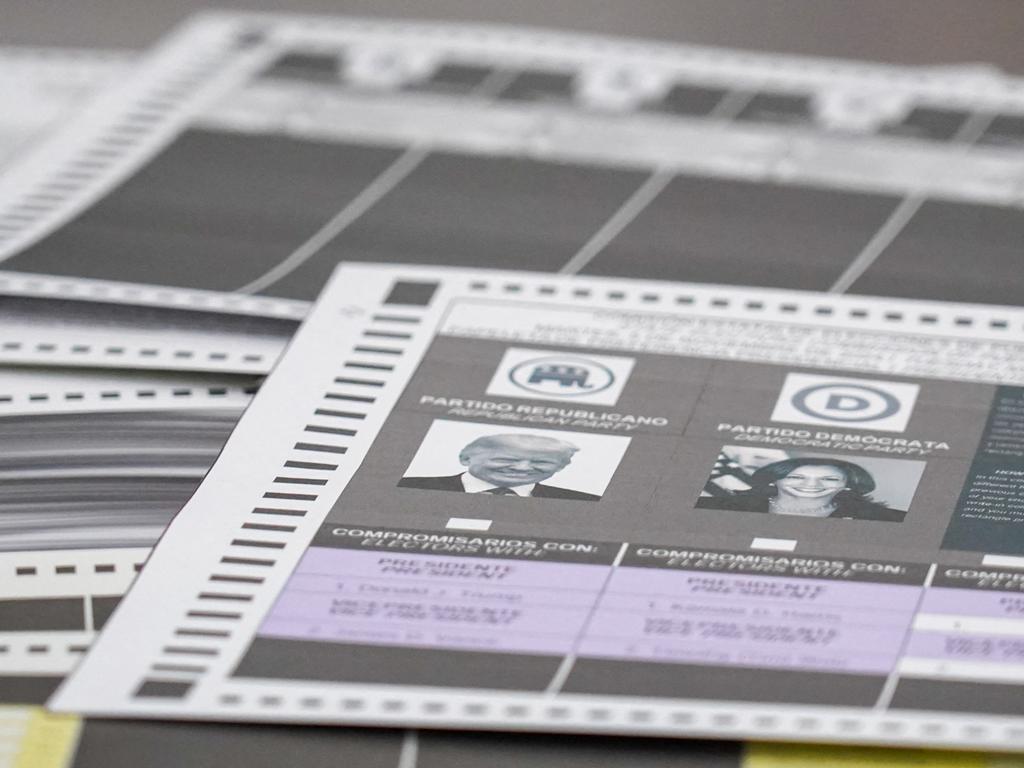It’s highly unlikely the world will know today if Donald Trump or Kamala Harris wins the election
Billions of eyeballs across the globe will be on America today as the country votes, but days of chaos could quickly erupt for a few big reasons.

Here in Australia, the outcome of state and federal elections tends to be known on the evening of voting day.
But as America heads to the polls to decide whether Kamala Harris or Donald Trump will be the next president, polling indicates the battle will be extremely tight.
As a result, it’s highly unlikely the outcome of the election will be known today. It could be days until the country – and the world – has an answer.
With the stakes high and tensions at boiling point, and considering Mr Trump’s baseless and long-running claims the 2020 vote was rigged and stolen, there’s a risk of chaos in the hours and days ahead.
Nervous wait last time around
Four years ago when then-president Trump faced off against Joe Biden, America – and the world – waited to find out the winner for four long days.
“This was largely due to razor-thin margins in the crucial battleground states, which resulted in some recounts, as well as large numbers of mail-in ballots that had to be counted after election day,” Richard Hargy, an expert in international relations from Queen’s University Belfast, wrote in analysis for The Conversation.
“There was the added challenge of this entire process being conducted amid a global pandemic.”
MORE:Aussie idea could gift Kamala the presidency
Some states have made changes to election laws since then in a bid to speed up the process, Dr Hargy explained.
For example, authorities in two key swing states say they’re confident they can swiftly count votes and determine a result.
Florida’s Secretary of State Cord Byrd told CNN the outcome in that crucial battleground will be known when “you go to bed tonight”.

MORE:Strange truth of Trump’s election home base
In the must-win state of Pennsylvania, Philadelphia’s City Commissioner Seth Bluestein told the cable news outlet that counting will be “much faster” than it was in 2020.
“But while it may not take as long this time round, one thing we can be sure of is that a winner will not be known on election night itself,” Dr Hargy said.
The issue of early voting
Before polls even opened, some 83 million Americans had already cast their votes, according to CNN – more than half the total number of people who voted at the 2020 election.
In many states, counting of those ballots can’t commence until polls close today.


There’s a rule in the swing state of Arizona that voters can complete their ballots and drop them off at a polling booth the day before and the day of the election.
It’s a quirk known as “late early voting”, Dr Hargy explained, and they can’t be counted until doors close.
“Pennsylvania is arguably the most prized swing state that both the Democratic and Republican campaigns are vying for. The state has 19 electoral votes, the most of any battleground state, so the victor will probably win the electoral college and thus also the presidency.
“But Pennsylvania does not allow election workers to process mail ballots until 7am local time on election day, which could mean the result takes longer than 24 hours after polls close to be made known.”

On the other hand, the states of Michigan and Nevada have made changes to the rules surrounding mail-in and early ballots, he said.
“These states now permit ballot papers to be processed in advance of polling day.”
Different open and close times
The way the vote itself is conducted also varies across the US, with individual states having the power to come up with their own processes.
Some open polling booths at 5am, while others kick off at 7am – and some as late as 10am.
And in some states, like Tennessee and New Hampshire, the opening and closing of polls can vary area to area, with counties or councils deciding on times.
It's here! The Downballot's famous poll closing times map is back, sponsored by @314action!
— The Downballot (@downballotnews) October 31, 2024
In the map below, all times are Eastern, but we have versions for every U.S. time zone (including territories!), plus one for color-blind folks. Find them here: https://t.co/HjkGNE2TzLpic.twitter.com/H6MIps28As
Election disruption attempts
Not long after polls opened in the key state of Georgia, multiple polling booths were urgently shut down temporarily after authorities received bogus bomb threats.
The Federal Bureau of Investigation said emails were sent warning of explosive devices planted at several locations.

A US intelligence source told CNN the email account had a Russian internet domain.
“One US official told CNN that investigators believe at least some of the threats originated in Russia,” it reported.
Georgia’s Secretary of State Brad Raffensperger also said some of the threats were sent from within Russia.
“None of the threats have been determined to be credible thus far,” the FBI said, but they did force the temporary closure of affected booths.
Will Trump concede if he loses? It’s unclear
Mr Trump still doesn’t accept that he lost the 2020 election and his running mate JD Vance has refused to say whether his potential future boss was unsuccessful at the ballot box.
Experts are bracing for a repeat, with the potential for some Republicans – and even Mr Trump himself – to “frustrate and delay election results in critical swing states”, Dr Hargy said.
“In January 2020, for example, a large number of Republicans in Congress objected to results in Pennsylvania and Arizona – states that were both won by Biden,” he said.
“And in seven swing states, people falsely claiming to be members of the electoral college attempted to declare Trump as the winner of their state.
“Their votes were sent to Congress to be counted alongside those of the true electors, with some Congress members arguing that the new slate of electoral votes cast doubts over the official result in certain states.
“In 2023, a Trump campaign lawyer, Kenneth Chesebro, pleaded guilty in Georgia to his role in subverting the election.”

Emma Shortis, a senior fellow at the School of Global, Urban and Social Studies at RMIT University,
Adjunct Senior Fellow, School of Global, Urban and Social Studies, RMIT University, that Mr Trump’s misinformation in the wake of the 2020 election might be repeated this time around.
“Trump and his surrogates like Steve Bannon … have exploited the differing times it takes to count votes to peddle baseless conspiracy theories, undermining Americans’ faith in their own democracy, and to incite unrest,” Dr Shortis wrote for The Conversation.
“This could very well happen again. Bannon, in fact, has just been released from prison after serving four months for contempt of Congress, and could once again be a driving force in any post-election challenges by the Trump campaign.
“Trump, meanwhile, lied again this week when he said ‘these elections have to be, they have to be decided by 9 o’clock, 10 o’clock, 11 o’clock on Tuesday night’ – laying the groundwork for further election conspiracies.”
Dr Shortis believes Mr Trump “will not accept another election loss”.
“If he does lose, he or his surrogates will attempt to weaponise similar conspiracy theories again. They may also use legal challenges to vote counts as they did in 2020 – both to contest the result and to once again mobilise the MAGA movement.”




